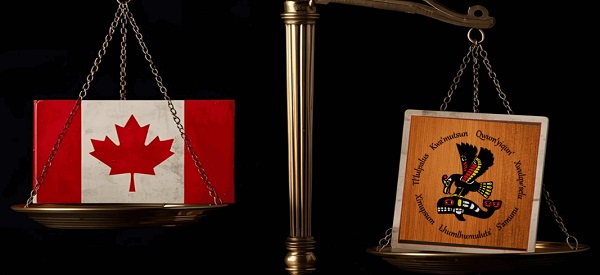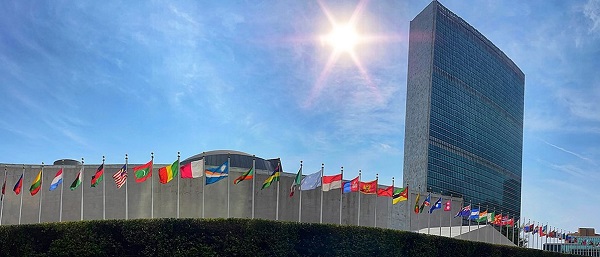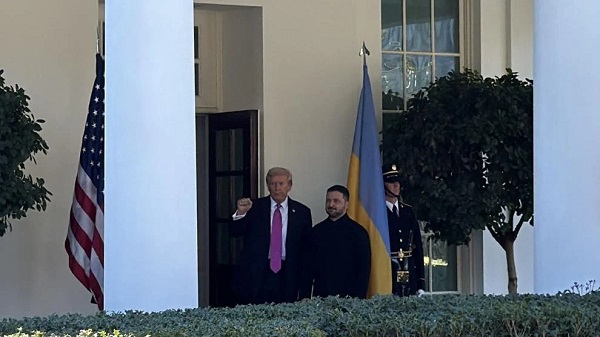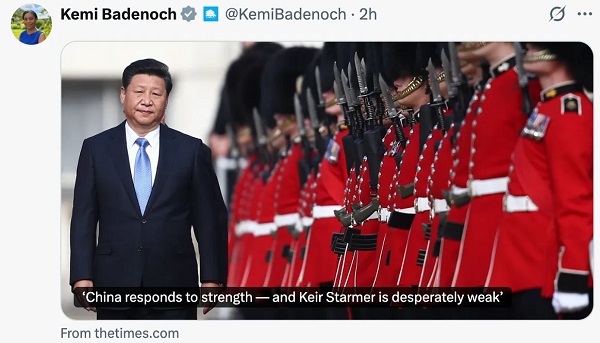Business
Poilievre calls on Carney to immediately scrap the Temporary Foreign Worker Program

News release from the Conservative Party of Canada
Today, the Hon. Pierre Poilievre, Leader of the Conservative Party of Canada and the Official Opposition, and the Hon. Michelle Rempel Garner, Shadow Minister for Immigration, announced their plan to tackle the Liberal unemployment crisis by permanently scrapping the Temporary Foreign Worker (TFW) program and immediately ending new permits.
“Prime Minister Carney has failed to meet his own already excessive immigration targets and now he’s on track to issue the highest number of TFW permits ever in a single year,” Poilievre said. “It’s time to take decisive action to protect our youth and workers.”
Under the Liberals, too many corporations are relying on cheap foreign labour while Canadians pay the price. Recent data shows a 7.4 percent increase in Employment Insurance requests since Carney took office (504,110 in March to 541,430 in June), while almost 400,000 Canadians have been searching for work for over two years – outside of the pandemic, this is the highest share of long-term unemployment since February 1998.
Youth employment is at its lowest in more than a quarter-century (outside the pandemic), while an oversaturated job market continues to suppress wages even for the gainfully employed. Companies like Tim Hortons, the once beloved coffee shop that gave a first paycheque to countless Canadian teens, have hired an almost unimaginable number of TFWs – 1,131 percent more for Tim Hortons over just four years alone.
“We know why a foreign-owned mega chain wants to be greedy – it’s good for their corporate profits – but our immigration system doesn’t exist to pad their bottom line,” Poilievre said. “That’s why the government should immediately stop issuing new TFW permits, and end this wage-suppressing, opportunity-stealing program.”
“Not long ago, young Canadians could gain vital skills in entry-level jobs, earn enough to pay for school, and build a future,” said Rempel Garner. “In return, employers built a skilled domestic workforce. But the Liberals broke that deal, leading to staggering youth unemployment and heartbreaking stories of graduates sending hundreds of resumes without a single callback.”
Over the last decade, TFWs have ballooned to almost two percent of our total private sector workforce. The impact is dramatic, considering that nearly three-quarters of these temporary immigrants earn less than the median income and exert downward pressure on wages.
That’s as Canadians struggle with an unemployment crisis that CIBC says matches “levels typically only seen during recessionary periods.” In June 2009, the height of the Great Recession, 684,200 Ontarians were out of work, 16,300 fewer than the 700,500 reported this July.
Yet, we are still bringing in record amounts of predominantly low-skilled foreign labour. Carney’s government has issued 105,000 new Temporary Foreign Worker permits in the first six months of 2025 alone. Despite a promised cap of 82,000, the Liberals are on track to issue the most TFW permits ever.
“As Canada’s economy slides into recession, productivity hits rock bottom, and AI disrupts the job market – all while we grapple with housing and healthcare crises – Canadian youth are trapped,” Rempel Garner added. “They can’t buy homes or start families without good-paying jobs, but they can’t get those jobs without experience, lost to competition from temporary foreign labour.”
Under this urgently-needed plan, the Temporary Foreign Workers program would be permanently abolished with a separate, standalone program for legitimately difficult-to-fill agricultural labour. For ultra-low-unemployment regions, there will be a transition period of, at most, five years while the program winds down, but no new permits will be issued anywhere in Canada.
It’s time for Canadian jobs for Canadian workers. If Mark Carney is serious about fixing the immigration system his party broke, he would immediately enact these reforms. Conservatives will always fight to protect our youth and all Canadians from reckless policies that lock them out of work and suppress their wages.
Business
US government buys stakes in two Canadian mining companies

From the Fraser Institute
Prime Minister Mark Carney recently visited the White House for meetings with President Donald Trump. In front of the cameras, the mood was congenial, with both men complimenting each other and promising future cooperation in several areas despite the looming threat of Trump tariffs.
But in the last two weeks, in an effort to secure U.S. access to key critical minerals, the Trump administration has purchased sizable stakes in in two Canadian mining companies—Trilogy Metals and Lithium Americas Corp (LAC). And these aggressive moves by Washington have created a dilemma for Ottawa.
Since news broke of the investments, the Carney government has been quiet, stating only it “welcomes foreign direct investment that benefits Canada’s economy. As part of this process, reviews of foreign investments in critical minerals will be conducted in the best interests of Canadians.”
In the case of LAC, lithium is included in Ottawa’s list of critical minerals that are “essential to Canada’s economic or national security.” And the Investment Canada Act (ICA) requires the government to scrutinize all foreign investments by state-owned investors on national security grounds. Indeed, the ICA specifically notes the potential impact of an investment on critical minerals and critical mineral supply chains.
But since the lithium will be mined and processed in Nevada and presumably utilized in the United States, the Trump administration’s investment will likely have little impact on Canada’s critical mineral supply chain. But here’s the problem. If the Carney government initiates a review, it may enrage Trump at a critical moment in the bilateral relationship, particularly as both governments prepare to renegotiate the Canada-U.S.-Mexico Agreement (CUSMA).
A second dilemma is whether the Carney government should apply the ICA’s “net benefits” test, which measures the investment’s impact on employment, innovation, productivity and economic activity in Canada. The investment must also comport with Canada’s industrial, economic and cultural policies.
Here, the Trump administration’s investment in LAC will likely fail the ICA test, since the main benefit to Canada is that Canadian investors in LAC have been substantially enriched by the U.S. government’s initiative (a week before the Trump administration announced the investment, LAC’s shares were trading at around US$3; two days after the announcement, the shares were trading at US$8.50). And despite any arguments to the contrary, the ICA has never viewed capital gains by Canadian investors as a benefit to Canada.
Similarly, the shares of Trilogy Minerals surged some 200 per cent after the Trump administration announced its investment to support Trilogy’s mineral exploration in Alaska. Again, Canadian shareholders benefited, yet according to the ICA’s current net benefits test, that’s irrelevant.
But in reality, inflows of foreign capital augment domestic savings, which, in turn, provide financing for domestic business investment in Canada. And the prospect of realizing capital gains from acquisitions made by foreign investors encourages startup Canadian companies.
So, what should the Carney government do?
In short, it should revise the ICA so that national security grounds are the sole basis for approving or rejecting investments by foreign governments in Canadian companies. This may still not sit well in Washington, but the prospect of retaliation by the Trump administration should not prevent Canada from applying its sovereign laws. However, the Carney government should eliminate the net benefits test, or at least recognize that foreign investments that enrich Canadian shareholders convey benefits to Canada.
These recent investments by the Trump administration may not be unique. There are hundreds of Canadian-owned mining companies operating in the U.S. and in other jurisdictions, and future investments in some of those companies by the U.S. or other foreign governments are quite possible. Going forward, Canada’s review process should be robust while recognizing all the benefits of foreign investment.
Business
Judges are Remaking Constitutional Law, Not Applying it – and Canadians’ Property Rights are Part of the Collateral Damage

By Peter Best
The worst thing that can happen to a property owner isn’t a flood or a leaky foundation. It’s learning that you don’t own your property – that an Aboriginal band does. This summer’s Cowichan Tribes v. Canada decision presented property owners in Richmond B.C. with exactly that horrible reality, awarding Aboriginal
title to numerous properties, private and governmental, situated within a large portion of Richmond’s Fraser River riverfront area, to Vancouver Island’s
Cowichan Tribes. For more than 150 years, these properties had been owned privately or by the government. The Cowichan Tribes had never permanently lived
there.
But B.C. Supreme Court Justice Barbara Young ruled that because the lands had never been formally surrendered by the Cowichans to the Crown by treaty, (there
were no land-surrender treaties for most of B.C.), the first Crown grants to the first settlers were in effect null and void and thus all subsequent transfers down
the chain of title to the present owners were defective and invalid.
The court ordered negotiations to “reconcile” Cowichan Aboriginal title with the interests of the current owners and governments. The estimated value of the
property and government infrastructure at stake is $100 billion.
This ruling, together with previous Supreme Court of Canada rulings in favour of the concept of Aboriginal title, vapourizes more than 150 years of legitimate
ownership and more broadly, threatens every land title in most of the rest of B.C. and in any other area in Canada not subject to a clear Aboriginal land surrender
treaty.
Behind this decision lies a revolution – one being waged not in the streets but in the courts.
In recent years Canadian judges, inspired and led by the Supreme Court of Canada, have become increasingly activist in favour of Aboriginal rights, in effect
unilaterally amending our constitutional order, without public or legislative input, to invent the “consult and accommodate” obligation, decree Aboriginal title and grant Canadian Aboriginal rights to American Indians. No consideration of the separation of powers doctrine or the national interest has ever been evidenced by
the Court in this regard.
Following the Supreme Court’s lead, Canadian judges have increasingly embraced the rhetoric of Aboriginal activism over restrained, neutral language, thus
sacrificing their need to appear to be impartial at all times.
In the Cowichan case the judge refused to use the constitutional and statutory term “Indian,” calling it harmful, thereby substituting her discretion for that of our
legislatures. She thanked Aboriginal witnesses with the word “Huychq’u”, which she omitted to translate for the benefit of others reading her decision. She didn’t
thank any Crown witnesses.
What seems like courtesy in in fact part of a larger pattern: judges in Aboriginal rights cases appearing to adopt the idiom, symbolism and worldview of the
Aboriginal litigant. From eagle staffs in the courtroom, to required participation in sweat lodge ceremonies, as in the Supreme Court-approved Restoule decision,
Canada’s justice system has drifted from impartial adjudication toward the appearance of ritualized, Aboriginal-cause solidarity.
The pivot began with the Supreme Court’s 1997 Delgamuukw v. British Columbia decision, which first accepted Aboriginal “oral tradition” hearsay evidence. Chief
Justice Lamer candidly asked in effect, “How can Aboriginals otherwise prove their case?” And with that question centuries of evidentiary safeguards intended
to ensure reliability vanished.
In Cowichan Justice Young acknowledged that oral tradition hearsay can be “subjective” and is often “not focused on establishing objective truth”, yet she
based much of her ruling on precisely such “evidence”.
The result: inherently unreliable hearsay elevated to gospel, speculation hardened into Aboriginal title, catastrophe caused to Richmond private and government property owners, the entire land titles systems of Canadian non-treaty areas undermined, and Crown sovereignty, the fount and source of all real property rights generally, further undermined.
Peter Best is a retired lawyer living in Sudbury, Ontario.
The original, full-length version of this article was recently published in C2C Journal.
-

 Agriculture1 day ago
Agriculture1 day agoIs the CFIA a Rogue Agency or Just Taking Orders from a Rogue Federal Government?
-

 Business2 days ago
Business2 days agoJudges are Remaking Constitutional Law, Not Applying it – and Canadians’ Property Rights are Part of the Collateral Damage
-

 Red Deer2 days ago
Red Deer2 days agoYour last minute election prep: Common Sense Red Deer talks to the candidates
-

 Business2 days ago
Business2 days agoTrump Blocks UN’s Back Door Carbon Tax
-

 Business2 days ago
Business2 days agoTrump Admin Blows Up UN ‘Global Green New Scam’ Tax Push, Forcing Pullback
-

 Daily Caller2 days ago
Daily Caller2 days agoTrump urges Putin, Zelenskyy to make a ‘deal’
-

 espionage1 day ago
espionage1 day ago“Suitcase of Cash” and Secret Meeting Deepen Britain’s Beijing Espionage Crisis
-

 Energy6 hours ago
Energy6 hours agoMinus Forty and the Myth of Easy Energy







